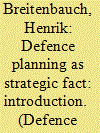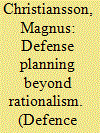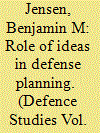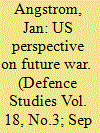|
|
|
Sort Order |
|
|
|
Items / Page
|
|
|
|
|
|
|
| Srl | Item |
| 1 |
ID:
160720


|
|
|
|
|
| Summary/Abstract |
With this special issue of Defence Studies, we situate defence planning as a constitutive element of defence and strategic studies. Indeed, in addition to the usual “downstream” focus on the use or non-use of force, on policy decision-making in foreign relations, military operations and global external engagement, we argue for the utility of an increased “upstream” focus on what is a major part of everyday defence and security policy practice for military, civilian administrative and political leadership: the forward-looking preparations for the armed forces and other capabilities of tomorrow. In particular, the special issue contributions explore two general dimensions of defence planning: the long-term, historical relationship between defence planning and the state including national variations in civil-military relations, and a concurrent tension between defence planning as an administrative, analytically neutral activity and the politics of its organisation and outcomes. In both of these, defence planning appears as a particular case of general planning, as a lens that enables particular foci on the external world to come about on behalf of the state while also sometimes creating institutionalised biases along the way. In this manner, paraphrasing Émile Durkheim, defence planning emerges as a “strategic fact” with dynamics of its own.
|
|
|
|
|
|
|
|
|
|
|
|
|
|
|
|
| 2 |
ID:
160721


|
|
|
|
|
| Summary/Abstract |
This article analyzes U.S. defense planning, and more specifically the public administration of the third offset strategy. The U.S. defense bureaucracy is rooted in a tradition of rational planning, which assumes a process of consistent, value-maximizing choices within specified constrains. The cornerstone in this tradition is the program budgeting system, once created to connect plans with budgets according to preferences. The third offset strategy, aimed at dealing with the challenges of geopolitical competition and budget austerity, is influenced by a different public administration philosophy described as metagovernance. Metagovernance is a challenge to rational planning as it entails an indirect approach of organizing arenas for networks, in which start-up companies and civilian corporations get to interact with government officials in order to identify incrementally suitable acquisition projects. Furthermore, the article contextualizes this tendency in reflexive modernity, in which rationality breaks down due to the pace of societal changes and planning processes constantly become subject to feedback.
|
|
|
|
|
|
|
|
|
|
|
|
|
|
|
|
| 3 |
ID:
160725


|
|
|
|
|
| Summary/Abstract |
This article explores the relevance of geography in NATO defence planning. Historical analysis of strategic concepts and other planning documents suggests a pendulum movement from treating geography as the central organising principle within the alliance, to downplaying its role in favour of functional considerations, and back. In view of mounting tensions alongside Europe’s eastern and southern flanks, this argument acquires contemporary relevance with regards to how alliance responsibilities can be (re)distributed. Rediscovering the early principle that allies should concentrate on those tasks for which they are the most geographically suited offers a promising approach for a new division of labour.
|
|
|
|
|
|
|
|
|
|
|
|
|
|
|
|
| 4 |
ID:
160723


|
|
|
|
|
| Summary/Abstract |
Which ideas shape defense planning and why? The following paper builds on over 80 interviews with senior defense officials to dissect the origin, evolution, and fall of the Revolution in Military Affairs (RMA), a major post-Cold War US defense innovation paradigm. In studying the emergence and diffusion of the RMA concept, my research suggests a central role for collective actors sharing constitutive ideas about practice and competing for legitimate authority and influence in the defense establishment. The rise of the RMA as an organizing idea in U.S. defense planning is thus not reducible to bureaucratic competition, technological determinism, or strategic culture as an external set of norms. Rather, it can be portrayed as a social process involving boundary activation by bureaucrats and soldiers (re)interpreting their key tasks and core missions for future war.
|
|
|
|
|
|
|
|
|
|
|
|
|
|
|
|
| 5 |
ID:
160722


|
|
|
|
|
| Summary/Abstract |
Defense ministries conduct strategic planning in various ways. In this article I outline tradeoffs in the design of strategic planning processes, and consider the implications of these tradeoffs for choices about the conduct of defense planning in different circumstances. Whereas an inclusive and transparent planning process is well-suited to building internal and external buy-in for a defense strategy, a more exclusive and opaque process is more likely to generate a defense strategy that departs from the status quo and speaks candidly about key challenges. The design of a defense planning process should therefore be informed by certain features of its context, such as whether the international security environment is stable or in flux and whether the defense ministry enjoys or lacks strong political support. I base the article’s findings on an in-depth analysis of the U.S. Quadrennial Defense Review, which served for nearly two decades as the major strategy process of the U.S. Department of Defense. This analysis draws on interviews I conducted of 23 defense officials and experts, as well as primary and secondary sources. More generally, my findings highlight for scholars and practitioners the importance of understanding how planning processes can shape defense and national security policies.
|
|
|
|
|
|
|
|
|
|
|
|
|
|
|
|
| 6 |
ID:
160724


|
|
|
|
|
| Summary/Abstract |
This article addresses why the US in its military operations tends to focus on only one dimension in war – the military narrowly understood. More precisely, in the US case, its armed forces tend to be preoccupied with platforms and understand military capabilities as those that deliver death and destruction. I explain this one-sided understanding of the military dimension in war with how the US armed forces think about future war. How the US understands future war is, in turn, a reflection of how it organizes its long-term defense planning procedures. In particular, by approaching the concept of future as by and large structurally determined, a focus on platforms becomes natural. Investments in weapons systems, too, are more easily motivated to Congress since it is easier to attach a price to developing, for example, a new submarine than it is to attach a price to the cost of developing a military organization that is adaptive, learning and anticipating. The understanding of the future as something that happens whether you like it or not is particularly odd in the US context where of course a central tenet of the American dream is that the individual creates her own future.
|
|
|
|
|
|
|
|
|
|
|
|
|
|
|
|
|
|
|
|
|